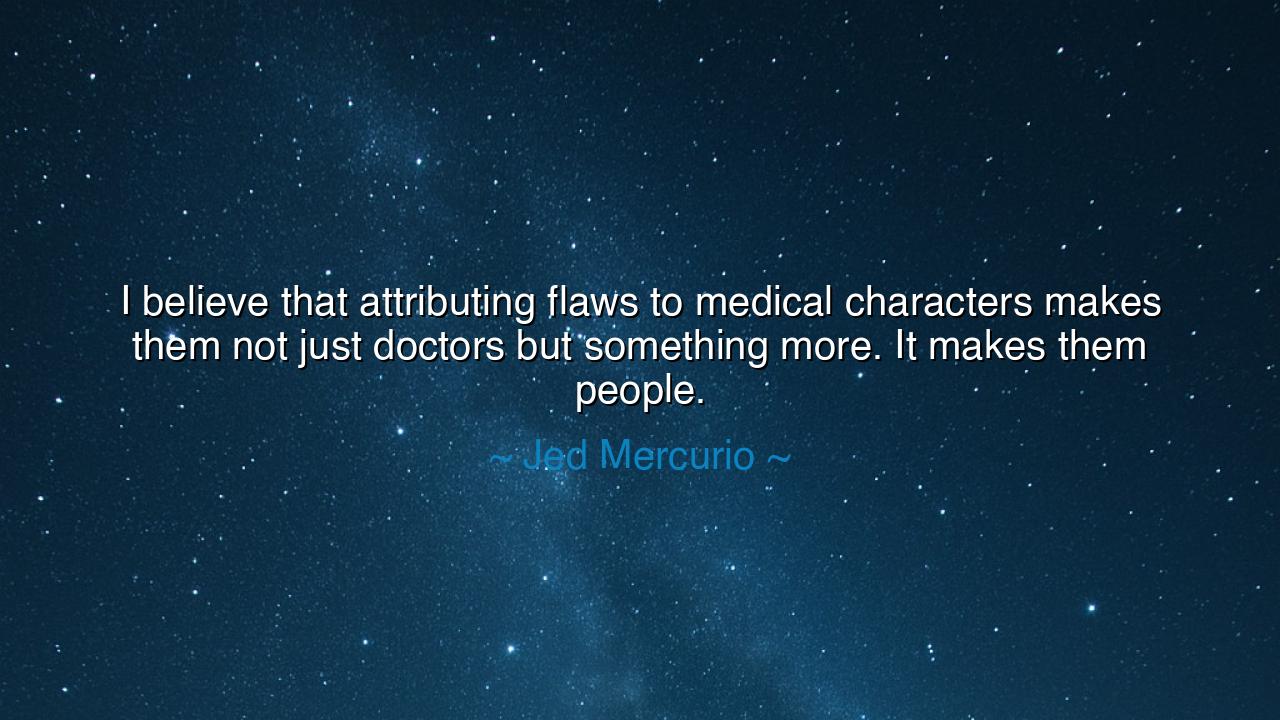
I believe that attributing flaws to medical characters makes them
I believe that attributing flaws to medical characters makes them not just doctors but something more. It makes them people.






The words of Jed Mercurio—“I believe that attributing flaws to medical characters makes them not just doctors but something more. It makes them people.”—carry the weight of both artistry and truth. They speak not only to the craft of storytelling, but to the nature of humanity itself. In these words, Mercurio reminds us that perfection, though worshiped by society, is sterile; and that it is through imperfection that we come to recognize the beauty, struggle, and nobility of being human. The doctor, so often portrayed as a figure of pure reason or divine control, becomes—through his flaws—something far greater than an ideal: he becomes real. And reality, with all its contradictions, is the seedbed of compassion.
In his quote, Mercurio draws from his dual life as both physician and writer, one who has seen firsthand the tension between human vulnerability and professional expectation. The doctor’s role, in the eyes of the world, is that of the healer—the calm hand in the storm, the unbreakable presence before pain and death. Yet behind the white coat lives a heart that trembles, a soul that doubts, and a mind haunted by choices made in the shadow of consequence. To reveal those flaws in art is not to diminish the doctor’s greatness, but to magnify it. For courage is meaningless without fear, and mercy without the capacity for error is not mercy at all—it is mechanics. In showing their flaws, Mercurio gives doctors—and all who labor under the burden of perfection—the grace to be human.
The origin of these words lies in Mercurio’s groundbreaking work as the creator of medical dramas such as Cardiac Arrest and Bodies, where he portrayed the medical world not as a place of sterile heroism, but as a realm of moral complexity, fatigue, and fallibility. He had himself walked those corridors, heard the cries that echo through hospital walls, and witnessed how good men and women wrestle with impossible decisions. His characters are not gods of healing—they are mortals struggling with guilt, ego, exhaustion, and love. In giving them these flaws, he does not strip them of dignity; rather, he clothes them in truth. He lets us see what the ancients knew well: that the divine spark within humanity shines brightest through the cracks.
This truth is not confined to medicine. Throughout history, the greatest figures—the heroes, philosophers, and artists—have been shaped by their flaws as much as by their virtues. Consider Hippocrates, the father of medicine, who once admitted that “life is short, art is long, opportunity fleeting, experience treacherous, and judgment difficult.” He did not claim omniscience; he confessed limitation. Or think of Leonardo da Vinci, whose genius was matched only by his restlessness, his unfinished works, his perpetual dissatisfaction. These flaws did not tarnish his brilliance; they deepened it. They remind us that imperfection is the mark of authenticity, the living proof that greatness is not born from flawlessness, but from perseverance through one’s own contradictions.
Mercurio’s philosophy also carries a moral echo: that to understand others, one must first accept the brokenness within oneself. When we see the doctor as flawed, we no longer place him on a pedestal beyond our reach; we see in him a reflection of our own frailty. The healer, too, bleeds; the rescuer, too, needs saving. This recognition invites humility and empathy, for it closes the distance between patient and physician, between audience and character, between human and human. By attributing flaws to medical characters, Mercurio is teaching us to look beyond the mask of authority—to see the trembling hands that steady themselves, the weary eyes that still choose kindness despite despair.
In the ancient world, the philosopher Seneca wrote that “to err is human, but to persist in error is diabolical.” Mercurio’s words resonate with this wisdom: flaws are not sins to be hidden, but truths to be confronted. The doctor who hides his humanity risks losing it; the one who accepts it becomes more compassionate, more real, and paradoxically, more capable of healing. This is not only a lesson for physicians, but for all who walk through life striving for impossible perfection. To embrace one’s flaws is not to surrender to them—it is to master them, to understand that our weaknesses, when acknowledged, become the soil in which our strength takes root.
From Jed Mercurio’s insight, let every listener take this timeless lesson: to be human is to be imperfect, and to be imperfect is to be alive. The world does not need more flawless heroes—it needs honest ones. In our work, our relationships, and our aspirations, let us not fear the cracks in our character, for it is through them that light enters. The doctor, the artist, the teacher, the leader—all become truly great not when they hide their humanity, but when they reveal it and rise despite it. For perfection inspires admiration, but imperfection inspires love—and love, in the end, is the truest form of healing.
Thus, when Mercurio says that giving flaws to his medical characters “makes them people,” he speaks not only as a writer but as a philosopher of the human spirit. His words are a quiet rebellion against the myth of perfection, a call to embrace authenticity as the highest virtue. Let us, then, carry this wisdom forward: do not chase flawlessness; chase truth. Do not strive to seem unbreakable; strive to be whole. For in every flaw acknowledged, in every vulnerability accepted, lies the deepest power of all—the power to connect, to heal, and to be fully, gloriously human.






AAdministratorAdministrator
Welcome, honored guests. Please leave a comment, we will respond soon